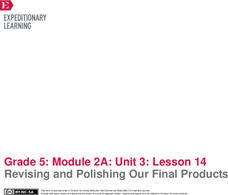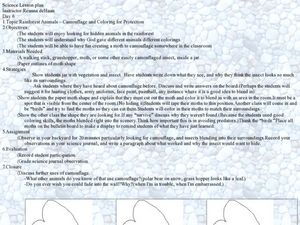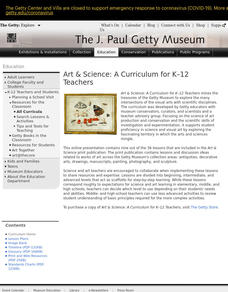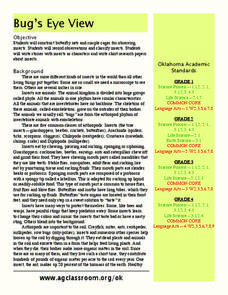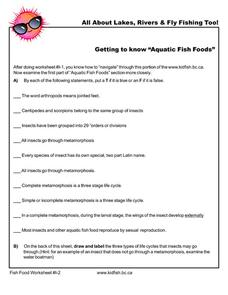Captain Planet Foundation
Energy Flow in the Garden
How can you tell what an owl has eaten? Study the food chain and flow of energy in an ecosystem by dissecting an owl pellet and noting the bones found inside. Additionally, the lesson includes a game about consumers and producers with a...
EngageNY
Revision and Illustration: Strengthening the Writing in my Rainforest Field Journal and Adding a Labeled Drawing
Let me draw you a picture. Scholars read a quote from Roger Tory Peterson and discuss his views on drawings. They then create their own drawings of an ant or butterfly to add to their science journals.
EngageNY
Revising and Polishing Our Final Products
One, two, three go! Scholars work independently to finalize the three components of their final task. They complete a science journal entry, scientific text box, and scientific drawing. While working, learners sign up for an appointment...
Curated OER
Invertebrates
Students identify insect body parts and look for local insect life. They create an insect using recycled material and design a classroom mural with bug facts. They study Monarch butterflies and dragonflies.
Curated OER
Termite Biology
Students explore the physical characteristics, distribution and habitat of termites. The lesson focuses on the termite as a social creature contrary to most other insects.
Curated OER
Rainforest Animals – Camouflage and Coloring for Protection
Students explain why animals need to blend in with their surrounding. In this environmental science instructional activity, students create moth paper models to simulate animals hidden in the rainforests. They make a bulletin board...
Curated OER
Ask the Antlion
Middle schoolers observe and examine the life cycle of antlions, recording their observations of the live insects in a journal. They view an antlion on a video microscope, draw the body parts, and replicate their experiment at home.
Curated OER
Creepy Crawlies
Students investigate various insects through different activities. They read the book, The Very Hungry Caterpillar by Eric Carle. They recite nursery rhymes and play Bingo with pictures of insects. They consider insect-related poems...
Curated OER
Ants
In this science worksheet, students learn that ants live underground. Students complete a maze from an anthill to an ant's home underground
Curated OER
Picture Scramble: Black-winged Damselfly, Balsam Poplar, Yellowjacket
In this science and visual discrimination worksheet, students examine images of a damselfly, balsam poplar and a yellowjacket. Next to each picture is the same image which has been divided into 9 pieces and scrambled. Students place the...
Curated OER
Bug Hunt
Students examine the different characteristics of bugs in their local area. They take characteristics of bugs they have observed and create their own new insect. They draw their new bug and share it with the class.
Curated OER
"The Good, The Bad, and The Smelly."
Students explore insects' use of pheromones and beneficial insects versus insect pests.
Curated OER
Clearly Classified
Learners investigate plants and insects. In this science classification lesson plan, young scholars create separate categories for insects and plants by characteristics. Learners discover scientific names of insects.
Curated OER
Summer: Getting the Bugs Out
Students study biodiversity while examining insects. They research insects that already exist and how they adapt to their environment.
Curated OER
All About Ants
Students create model ants in order to study the characteristics of insects such as body segments, number of legs, and feelers, as well as how these characteristics serve the insect.
Curated OER
Buggy Diner
Students observe different insects and the different kinds of foods they like to eat. In this insects lesson plan, the teacher collects insects and different plants and roots. Then the students learn about those insects and have to be...
Curated OER
"What Insecit Am I"
Learners play the game "What Insect Am I" to explore the parts of an insect and their habitats.
Curated OER
Beneficial Bug Scavenger Hunt
Students identify several beneficial insects and spiders, including predators and pollinators. They search an outdoor environment and record numbers and types of beneficial insects and spiders that they discover.
Curated OER
Let's Create an Ecosystem
Seventh graders discover how an ecosystem works by creating one in class. In this Earth science lesson, 7th graders study vocabulary terms associated with ecosystem and read environment handouts. Students create an observatory...
Curated OER
Bug's Eye View
Pupils explore biology by writing fictitious stories in class. In this insect life lesson, students identify many different types of insects in the animal kingdom and the classifications they fall into. Pupils collect insects on a field...
Curated OER
Mouthpart Madness
Learners explore the basic biology of a pest. They identify the four major kinds of insect mouthparts and explain how they work. Students examine the specific mouthparts and how they can limit food resources and in what environment an...
Curated OER
Getting to Know "Aquatic Fish Foods"
In this fish worksheet, students access a website to learn more about the common insects eaten by fish. Then students draw and label three types of insect life cycles. This worksheet has 10 true or false questions and 3 drawings.
Curated OER
The Spider Beside Her
Second graders expand their knowledge of spiders. By creating a model of a spider, 2nd graders recognize differences between spiders and insects and determine that a spider is not an insect.
Curated OER
Protect Yourself
Students read about the marketing of permethrin-treated clothing to help prevent insect borne illnesses. They design a poster to create awareness of an insect, animal or plant species which is harmful to humans.
Other popular searches
- K 2 Life Science Insects
- Science Insects
- Parts of Insects Science
- Life Science Insects
- Science Spiders vs Insects
- Esl Lessons Science Insects
- Esl Science Insects




